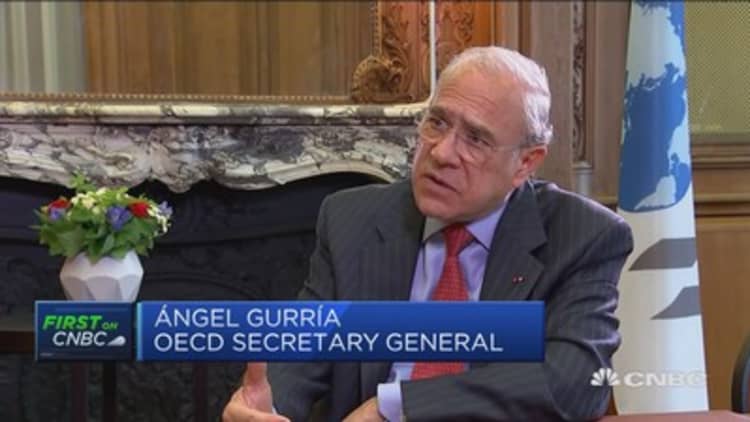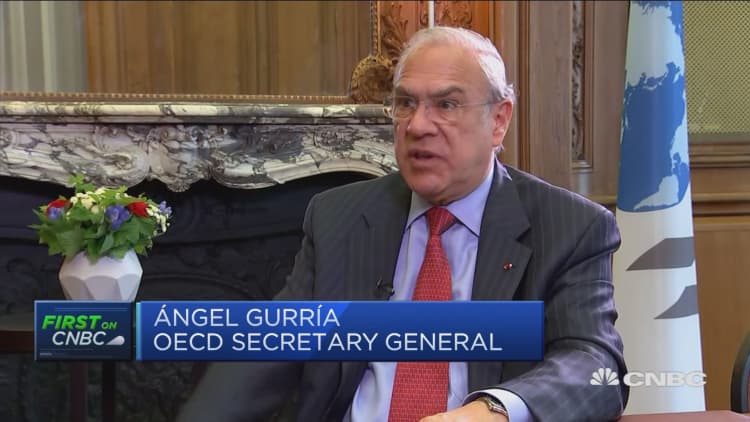The current outlook for growth is bright, but specific risks could endanger long-awaited progress, according to a report released Wednesday by the Organization for Economic Cooperation and Development (OECD).
Global gross domestic product (GDP) growth is nearing the long-term average of 4 percent, the "cruising speed" reached before the financial crisis, the OECD's 2018 Economic Outlook report said. Unemployment across the body's 35 member states, most of which are considered highly developed, is at its lowest since 1980.
But a brewing combination of rising oil prices, trade tensions and financial market vulnerabilities could coalesce amid an environment of monetary tightening, spelling potential disaster.

Economic expansion is still being fuelled by low interest rates and fiscal stimulus, meaning that it isn't entirely organic and is more vulnerable to market and political changes, warned OECD Secretary-General Jose Angel Gurria.
"The economic expansion is set to continue for the coming two years, and the short-term growth outlook is more favorable than it has been for many years," he told the press during the OECD's annual forum in Paris. "However, the current recovery is still being supported by very accommodative monetary policy, and increasingly by fiscal easing. This suggests that strong, self-sustaining growth has not yet been attained."
Oil prices have risen significantly in the past year, and if they continue along this trend — some experts forecast a return to $100 a barrel — economies will see serious inflationary pressures and lower household growth, the report said.
And as central banks move away from monetary easing and raise interest rates, particularly in the U.S., this normalization could expose the economic vulnerabilities created by years of financial risk-taking and mounting debt. Public and private debt are at record highs, and for emerging markets with heavy leverage in foreign currency, the economic pain is already manifesting itself.
More fiscal easing like tax cuts and increased public spending — as is underway in the U.S. — exacerbates these risks, the report said.

To counter this, the OECD stressed the need for structural reforms and policies aimed at boosting skills, increasing workforce productivity and investing in innovation.
Phil O'Reilly, chair of the OECD's Business and Industry Advisory Committee (BIAC), told CNBC that the only way to avoid a crisis brought on by unmanageable debt is to pursue growth via such reforms.
"Fiscal stimulus is only good for a little while," O'Reilly said. "The idea of high debt is obviously an economic destabilizer. The answer is solid economic growth that goes beyond stimulus-driven growth and that's based on the fundamentals."
Achieving this growth will rely on three core reform areas, he said: skills advancement, digital inclusion and investment procedures.
"Businesses have for years called for education to line up with what employers need," O'Reilly said. "It's not expensive. It's tough to do politically, but just get on with it."
Digital infrastructure and digital inclusion, O'Reilly added, will be core to providing those in rural and underprivileged areas access to better tools for education, financial literacy, and business opportunities. And improved and simplified investment procedures, on both federal and local levels, will boost cross-border commercial flows and strengthen private sector job creation.
But in the absence of dedicated reforms and their effective enforcement, there will be trouble ahead.
"If you've got rising interest rates and you don't have business confidence in the long-term, you're going to see reducing business investment over time and you're going to see the end of the story of fiscal stimulus," O'Reilly said.
Against a backdrop of climbing oil prices, financial strains on emerging markets, tightening monetary policy, trade tensions and political shocks like those underway in Italy that potentially threaten all of Europe, the chances of these risks derailing global growth remain closer to home than many policymakers would like to admit.


